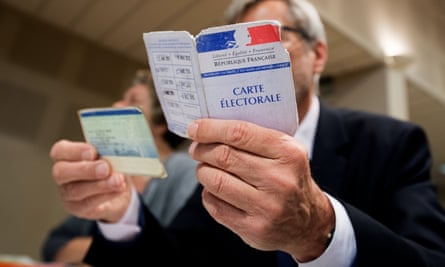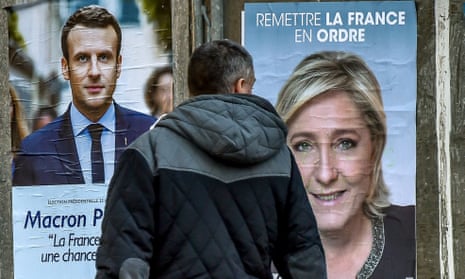It was a race, warned pretty much everybody, that was simply too close to call: four candidates bunched within five points of each other, and 25% of voters still undecided on polling day.
After calling the outcome of the UK’s Brexit referendum and November’s US election wrong – albeit not by very much – few were confident the opinion polls in the French presidential contest could be correct.
Support for the independent centrist and eventual victor, Emmanuel Macron, would fail to materialise, commentators warned, while far-right leader Marine Le Pen’s voters were notoriously shy, so under-represented.
The US polling guru Nate Silver tweeted that he “continued to worry about the lack of variation in French election polls. Polls shouldn’t be this consistent.” He thought pollsters might be massaging their results to be more similar to each other’s findings.
Yet France’s polling institutes called the result of Sunday’s first round right, and they did so with quite remarkable accuracy.
On 21 April, the last-day predictions were published, an average of the election’s nine rolling polls put Macron on 24%, Le Pen on 22%, scandal-hit rightwing candidate François Fillon on 20% and hard-left veteran Jean-Luc Mélenchon on 19%.
The final results, declared early on Monday morning by the French interior ministry, showed respective vote shares of 23.75%, 21.53%, 19.91% and 19.64%. For each of the top four candidates, the polls had been out by less than one percentage point.
“It was a relief,” said Bruno Jeanbart, the deputy managing director of OpinionWay, which is publishing a daily poll during the campaign. “This was a highly unusual contest, with lots of uncertainties – potentially very hard to get right.”
He cited the fact that French pollsters are used to “a straight race between left and right”. This time they had to deal with the arrival of Macron, running without a party; the impact of the fake job scandal that hit Fillon’s campaign, and the late surge of Mélenchon, another independent.
“In a period of political volatility, voters are making their mind up later, changing their minds more often about who they will vote for, and can also be more uncertain of whether they will vote at all,” Jeanbart said.

France has one of the highest rates of political opinion polling in the world, with at least one and often two or three major national polls appearing every day in an election year and dominating headlines.
Concerns about reliability surfaced long before Brexit and Trump, notably in 2002 when the Socialist prime minister, Lionel Jospin, was sensationally ejected from the second round against Jacques Chirac by Le Pen’s father, Jean-Marie.
The popular daily Le Parisien, generally a major consumer of opinion polls, was so worried this year that in January it announced it would stop commissioning polls in the run-up to the election and instead do more on-the-ground reporting.
But French polling groups had significantly refined their techniques over the past 15 years, Jeanbart said. Pollsters had become more expert at selecting more representative samples, and at weighting and adjusting them afterwards.
“We weight raw polling data according to past voting records, and we’ve become quite good at that,” Jeanbart said. “We’ve also gained a lot more experience in internet polling, which everyone has used in this election.”
French polling agencies’ post-collection adjustment techniques have developed mainly because of the experience of dealing with Front National voters who traditionally have been reluctant to reveal their preference.
“We’ve had to work with this phenomenon of the anti-establishment, protest vote since the mid-1980s,” Jeanbart said. “In Britain and America it’s more recent, which maybe made Brexit and Trump that bit harder to predict.”
There are problems associated with internet polling, particularly the way it tends to exclude older voters. But properly executed – and correctly adjusted – it can often be more revealing of shy voter behaviour than telephone polling.
“On the phone, people can sometimes be more eager to please the questioner – which is a bias you don’t get on the internet,” Daniel Roy of the Cevipof political science research institute told Challenges magazine last month.
French pollsters were fortunate in presidential elections because of the traditionally high turnout, Jeanbart said. “One of the biggest problems pollsters face is telling who will actually vote and who won’t,” he said. “Essentially, the higher the turnout, the lower the risk of polling error.”
Sample size and quality was also critical, Roy said. The largest, most carefully selected French polling panels – such as the Ipsos election surveys for Le Monde and the French public broadcasters, which is 10,000 strong – have a margin of error of less than 1%.
